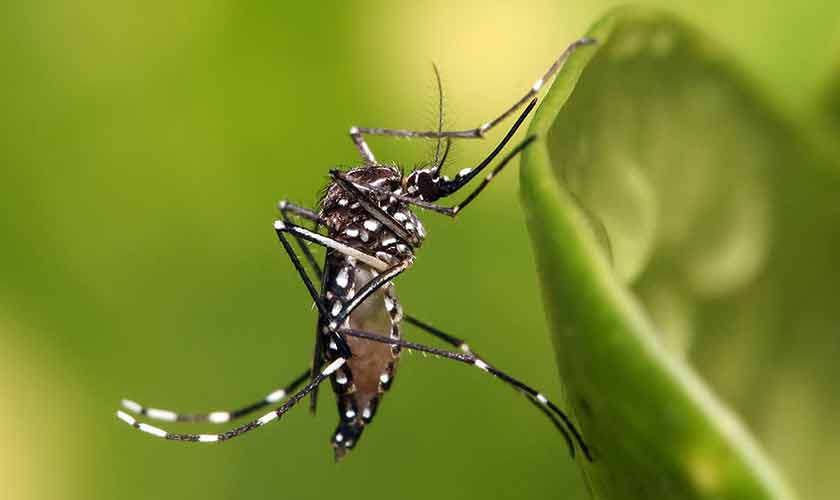Dengue Fever, also known as breakbone fever or bone breaker fever, is a mosquito-borne infection that can lead to a severe flu-like illness.
Thank you for reading this post, don't forget to subscribe!There are four dengue viruses (DENV) that cause dengue fever mainly arbovirus; Dengue fever is systemic disease caused by one of four serotypes of virus from the genus Flavivirus, which also includes the pathogens responsible for yellow fever and Japanese encephalitis.
They are all spread by a species of mosquito known as Aedes aegypti, and more rarely by the Aedes albopictus mosquito.
Aedes aegypti found in tropical areas around the world, especially in and around areas of human population.
The virus is transmitted from an infected mosquito to a human. A healthy mosquito bites a person who is infected with the dengue virus, and the virus is passed on when the mosquito bites someone else. This is called human-to-mosquito-to-human cycle of transmission.
Dengue fever virus (DENV) is an RNA virus of the family Flaviviridae; genus Flavivirus. Most are transmitted by arthropods (mosquitoes or ticks), and are therefore also referred to as arboviruses (arthropod-borne viruses). Once the mosquito becomes infective, it remains so for life. The virus attacks the genital tract of mosquito and start transmitting in the fully developed eggs at the time of oviposition.
It it possible to have dengue fever more than once, and second infection carries a higher risk of developing a harsher form. Mosquitoes that transmit the disease are day-biting so mosquito netting is of limited usefulness, and the only effective means of control has been to eliminate the Aedes vectors.
Dengue symptoms:
sudden onset of the fever five to eight days after a bite from one of several species of Aedes mosquito, including A. aegyptii, A. albopictus, and A. scutellaris.
After two to four days of severe headache, fever, and muscle aches, the disease eases for 12 to 48 hours before returning with a skin rash, chills, swollen and reddened eyes, and the severe joint pains.
Symptoms range from mild to severe. Severe symptoms include dengue shock syndrome (DSS) and dengue hemorrhagic fever (DHF).
Symptoms include:
- Aching muscles and joints
- Body rash that can disappear and then reappear
- High fever
- Intense headache
- Pain behind the eyes
- Vomiting or nausea
Symptoms usually disappear after a week, and mild dengue rarely involves serious or fatal complications.
Dengue hemorrhagic fever (DHF)
At first, mild symptoms of DHF may be gradually worsen within a few days. As well as mild dengue symptoms, there may be signs of internal bleeding.
A patient with Dengue hemorrhagic fever may experience:
- Bleeding from the mouth, gums, or nose
- Clammy skin
- Damage to lymph and blood vessels
- Internal bleeding, which can lead to black vomit and feces, or stools
- A lower number of platelets in the blood
- Sensitive stomach
- Small blood spots under the skin
- Weak pulse
Without prompt treatment, DHF can be fatal.
Dengue fever or Breakbone Fever shock syndrome (DSS)
DSS is a severe form of dengue and can be fatal.
Apart from symptoms of mild dengue fever, the patient may experience:
- Intense stomach pain
- Disorientation
- Sudden hypotension (drop in blood pressure)
- Heavy bleeding
- Regular vomiting
- Blood vessels leaking fluid
Without treatment of course this can result in death but a small number of cases will progress to the hemorrhagic form, in which bleeding from multiple organs and mucosal surfaces occurs, the mortality is about 5-7 percent.
Dengue is a virus, in allopathic drugs there is no specific treatment or cure (for all viruses). However, intervention can help, depending on how severe the disease is; while in Homoeopathic medicine there is very effective treatment for dengue.
For milder forms, treatment includes:
Preventing dehydration:
A high fever and vomiting can dehydrate the body. The person should drink clean water, Rehydration salts can also help replace fluids and minerals, if needed intravenous (IV) fluid transmission should be advised.
P.S: Allopathic Non-steroidal anti-inflammatory drugs (NSAIDs), such as aspirin or ibuprofen, are not advised, as they can increase the risk of internal bleeding.
Avoid blood transfusion, it will decrease patient’s immune system and of course lifespan. (Dr. Qaisar Ahmed MD, DHMS)
Hospitalization will allow the individual to be properly monitored, in case symptoms get worse.
High-risk areas
Dengue fever is most common in subtropical and tropical areas.
Unlike malaria, dengue can happen in both urban areas and rural areas, but is more common in rural areas.
Dengue fever or Breakbone Fever Diagnosis
The signs and symptoms of dengue fever are similar to typhoid fever and malaria. (This can sometimes delay an accurate diagnosis).
- NS1 is a diagnostic test for Dengue. The test is usually positive in first 4-5 days of fever.
- CBC is used to monitor patients suffering from Dengue fever.
- Molecular tests for dengue virus (PCR)—detect the presence of the virus itself; these tests can diagnose dengue fever up to 7 days after the onset of symptoms and can be used to determine which of the 4 different serotypes of dengue virus is causing the infection.
- Antibody tests, IgM and IgG—detect antibodies produced by the immune system when a person has been exposed to the virus; these tests are most effective when performed at least 4 days after exposure.
- Complete blood count (CBC)—to look for low platelet count typical of the later stages of the illness and to detect the decrease in hemoglobin, hematocrit, and red blood cell (RBC) count (evidence of anemia) that would occur with blood loss associated with severe dengue fever.
- Basic metabolic panel (BMP) – to monitor kidney function and look for evidence of dehydration that can occur with severe illness.
Proper Treatment of Dengue Fever or Breakbone Fever
Eupatorium Perfoliatum:
Back, pain in. Bilious fever. Bones, pains in. Cough. Dengue,Intermittent fever, Relapsing fever, Remittent fever, Spotted fever, Bilious fever, Jaundice, Hepatomegalia, Hepatic pain, Hepatic digestion problems. Diarrhoea. Gout. Hiccough. Hoarseness. Indigestion. Influenza. Measles, Herpes zoster, Ringworms, Mouth/lips cracking. Ophthalmia. Rheumatism. Syphilitic pains. Thirst.
Gelsemium:
Anterior crural neuralgia. Aphonia. Brain affections like Cerebro-spinal meningitis, Epilepsy and its effects, emotions, eyes (astigmatism), Amaurosis, Retina detachment (in high fevers), Hysteria, Locomotor ataxia, Mania, Meningitis, Hydro-salpingitis, Nystagmus, Nystagmus, Paralysis, Paralysis agitans, Paraplegia, Convulsions, Puerperal convulsions, Fright, Tremors, Deafness, Insomnia.
Choroiditis. Colds. Dengue fever, Bilious fever, Influenza, Remittent fever, Enteric fever or Typhoid fever, Intermittent fever, Jaundice, Hay-fever, Sun stroke and sun headache. Labour. Liver affections, Dysentery, Diarrhoea, Diphtheria, Constipation, Measles. Dupuytren’s contractions. Dysmenia. Gonorrhoea.
Menstruation, painful; suppressed. Metrorrhagia. Myalgia, Uterine affections
Albuminuria. Ptosis. Rheumatism. Teething. Tic-douloureux. Toothache. Vertigo. Voice loss. Writer’s cramp.
Bryonia Alba
Bilious attack, Bronchitis, Chlorosis, Coryza, Influenza, Cough, Dyspepsia, Eczema, Enteric fever, Intermittent fevers, Miliaria, Eruptions,. . Jaundice. Joints pain, Hepatic malfunctioning. Lumbago. Measles. Meningitis. Menstruation, vicarious.. Milk fever. Myalgia.
Rhus Tox
Dengue fever, Low appetite, Bones pain, Dispepsia, Cyanosis, Enteric fever or Typhoid, Typhus, Intermittent fever, Relapsing fever, Measles, Herpes zoster, Influenza, Pneumonia, Hepatic abscess, Scarlatina, Smallpox, Urticaria.
Ipecac
Severe headache, Nausea, Vomiting, State of vision constantly changing, Cyanotic, Coreza, Severe cough, cough with sputum, Intermittent fever, Chill, ever body pain sometimes with jerking, Dysentery.
Arsenic Album
Abscess, Acne rosacea, Epithelioma, Erysipelas, Eczema, Eruption Endometritis, Anaemia, Bronchitis, Carbuncle. Cholera Asiatica. Cholera. Cold. Coldness. Commissures, soreness of. Whooping-cough Cough, Pneumonia, Coxalgia. Croup, Delirium tremens, Measles. Depression of spirits.
Diarrhoea. Diphtheria. Dropsy. Duodenum. Dyspepsia, Gastric ulcer. Gastritis, Vomiting, Gastrodynia. Glandular swellings.
Hodgkin’s disease, Kidney diseases
Enteric fever, Typhoid, Fainting, Traumatic fever, Typhus. Fever, Headache, Hectic fever, Intermittent fever, Shiverings, Yellow fever, Jaundice, Neuralgia, Peritonitis, Pleurisy, Psoriasis. Purpura. Pyemia. Pyelitis, Remittent fever. Rheumatic gout. Rheumatism. Rickets. Ringworm. Scalded. Scarlatina. Sciatica. Scrofulous affections.
Sea-bathing, effects of. Sea-sickness.. Ulcers. Worms. Wounds.
China
Hectic fever, Intermittent fever, Hectic fever, Traumatic fever, Jaundice, Liver, diseases of; cirrhosis of. Menière’s disease, Psoriasis, Spleen affections, Gall-stone colic..
Cough. Debility. Delirium. Diarrhoea. Dropsy. Dyspepsia. Ears, deafness; noises in. Emissions. Empyema. Erysipelas. Facial neuralgia. Haemorrhages. Haemorrhoids. Headache. Hip-joint pain.
Carica Papaya
Severe temperature, breathing problem, severe vomiting, red skin, shivering, sever body pain and high blood pressure, lachrymation, vomiting, low appetite, fatigue, Hepatomegalia, splenic affections and pain.
Many plants extracts including Spilanthes calva, Sterculia guttata, Balanites aegyptiaca, Vitex negundo, Solanum xanthocarpum, Artemisia annua, Fagonia indica, Nerium indicum, Trigonella foenum, in different solvents have been reported to exhibit activity against Aedes aegypti L., a vector of dengue fever.
P. S : This article is only for doctors having good knowledge about Homeopathy and allopathy, for learning purpose(s).
For proper consultation and treatment, please visit our clinic.
Location, address and contact numbers are given below.
NoN of above mentioned medicine(s) is/are not the full/complete treatment, but just hints for treatment; every patient has his own constitutional medicine along with these mentioned above.
To order medicine by courier, please send your details at WhatsApp– +923119884588
 Dr. Sayyad Qaisar Ahmed (MD {Ukraine}, DHMS) ; senior research officer Dnepropetrovsk state medical academy Ukraine; is a leading Homeopathic physician practicing in Al-Haytham clinic, Umer Farooq Chowk Risalpur Sadder (0923631023, 03119884588), K.P.K, Pakistan.
Dr. Sayyad Qaisar Ahmed (MD {Ukraine}, DHMS) ; senior research officer Dnepropetrovsk state medical academy Ukraine; is a leading Homeopathic physician practicing in Al-Haytham clinic, Umer Farooq Chowk Risalpur Sadder (0923631023, 03119884588), K.P.K, Pakistan.
Find more about Dr. Sayyad Qaisar Ahmed at :
https://www.youtube.com/Dr Qaisar Ahmed
https://www.facebook.com/dr.qaisar.dixecosmetics
